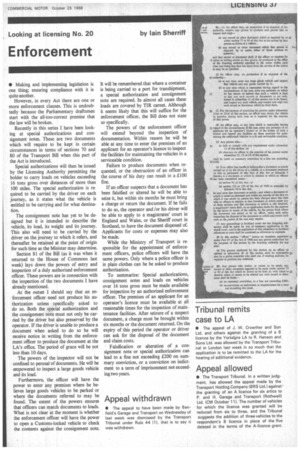Looking at licensing No. 20
Page 39

If you've noticed an error in this article please click here to report it so we can fix it.
Enforcement
by lain Sherriff
• Making and implementing legislation is one thing; ensuring compliance with it is quite another.
However, in every Act there are one or more enforcement clauses. This is undoub tedly because the Parliamentary draftsmen start with the all-too-correct premise that the law will be broken.
Recently in this series I have been looking at special authorizations and con signment notes. These are two documents which will require to be kept in certain circumstances in terms of sections 70 and 80 of the Transport Bill when this part of the Act is introduced.
Special authorizations will then be issued by the Licensing Authority permitting the holder to carry loads on vehicles exceeding 16 tons gross over distances of more than 100 miles. The special authorization is required to be carried by the driver on each journey, as it states what the vehicle is entitled to be carrying and for what destination.
The consignment note has yet to be designed but it is intended to describe the vehicle, its load, its weight and its journey. This also will need to be carried by the driver on the journey to which it refers, and thereafter be retained at the point of origin for such time as the Minister may determine.
Section 81 of the Bill (as it was when it returned to the House of Commons last week) lays down the powers of entry and inspection of a duly authorized enforcement officer. These powers are in connection with the inspection of the two documents I have already mentioned.
At the outset I should say that an enforcement officer need not produce his authorization unless specifically asked to do so. Both the special authorization and the consignment note must not only be carried by the driver but also preserved by the operator. If the driver is unable to produce a document when asked to do so he will receive notice in writing from the enforcement officer to produce the document at the LA's office. The period of grace will be not less than 10 days.
The powers of the inspector will not be confined to perusal of documents. He will be empowered to inspect a large goods vehicle and its load.
Furthermore, the officer will have the power to enter any premises where he believes large goods vehicles to be parked or where the documents referred to may be found. The extent of the powers ensures that officers can match documents to loads. What is not clear at the moment is whether the enforcement officer will have the power to open a Customs-locked vehicle to check the contents against the consignment note. It will be remembered that where a container is being carried to a port for transhipment, a special authorization and consignment note are required. In almost all cases these loads are covered by TIR carnet. Although it seems likely that this will suffice for the enforcement officer, the Bill does not state so specifically.
The powers of the enforcement officer will extend beyond the inspection of documentation. Within reason he will be able at any time to enter the premises of an applicant for an operator's licence to inspect the facilities for maintaining the vehicles in a serviceable condition.
Failure to produce documents when requested, or the obstruction of an officer in the course of his duty can result in a £100 fine.
If an officer suspects that a document has been falsified or altered he will be able to seize it, but within six months he must bring a charge or return the document. If he fails to do so, the operator and /or his driver will be able to apply to a magistrates' court in England and Wales, or the Sheriff court in Scotland, to have the document disposed of. Applicants for costs or expenses may also be made.
While the Ministry of Transport is responsible for the appointment of enforce ment officers, police officers will have the same powers. Only where a police officer is in plain clothes can he be asked to produce authorization.
To summarize: Special authorizations, consignment notes and loads on vehicles over 16 tons gross must be made available for inspection by an authorized enforcement officer. The premises of an applicant for an operator's licence must be available at all reasonable times for the inspection of maintenance facilities. After seizure of a suspect document, a charge must be brought within six months or the document returned. On the expiry of this period the operator or driver can ask for the disposal of the document and claim costs.
Falsification or alteration of a consignment note or special authorization can lead to a fine not exceeding £200 on summary conviction, or a conviction on indictment to a term of imprisonment not exceeding two years.
Appeal withdrawn
• The appeal to have been made by Benfield's Garage and Transport on Wednesday of last week was dismissed by the Transport Tribunal under Rule 44 (1), that is to say it was withdrawn.
















































































































